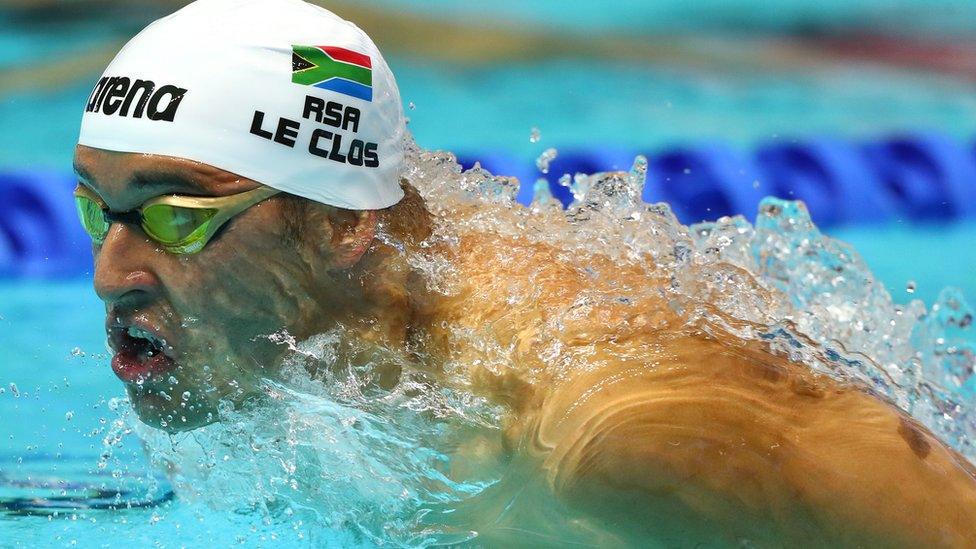Tokyo Olympics: Chad Le Clos wants to be 'best athlete South Africa has ever had'
- Published
South African Olympic Swimmer Chad Le Clos
When you've beaten history's most decorated Olympian in his prime, with Michael Phelps boasting a staggering 23 gold medals, you might think that could be enough to cement a place in your nation's sporting pantheon.
But that's not the case for South Africa's Chad Le Clos.
Like his hero Phelps, the 29-year-old is his country's most medalled swimmer, with the gold he won against the American at the 2012 Olympics joining the three silvers collected in both London and Rio de Janeiro four years ago.
This is not enough to satisfy the Durban-born swimming star though.
"I really do want to be recognised as the best," he told BBC Sport Africa. "I want them to say: 'Chad Le Clos - not only the guy that beat Michael Phelps, but the best athlete South Africa has ever had'."
To do this, he will need to up his Olympic medal tally in Tokyo, as three South Africans already have two golds - athlete Caster Semenya (2012, 2016), swimmer Penelope Heyns (1996) and tennis player Charles Winslow (1912).
Le Clos' tally of silvers, which is more than the two-time gold medallists, would take him clear if he can top a podium in Japan.
He will be competing in his third Olympics but, as with nearly all this year's Olympians, his preparations were hugely disrupted by the pandemic, with Covid-19 shutting down South Africa's leading swimming facilities.
"I've had a bad six months," Le Clos told BBC Sport Africa. "It's no secret that we haven't had the greatest build-up."
Multiple challenges
South Africa has been one of the country's worst hit by coronavirus in Africa in recent times and according to the World Health Organisation there have been more than 65,00 recorded deaths - and more than two million confirmed cases - since the start of the pandemic.
The country's red list status means travel was all but impossible for many athletes.
"When I left my team in November last year, we said 'we'll see you guys in the first week of January' but then South Africa went into the third wave and total lockdown," he recalled.
"We couldn't travel and the world (put) us on a red list. We kept saying 'See you in February, in March, in April" - but it never came. It's not the ideal situation in the lead up to Olympics."

Le Clos urged South Africans to stay in - but stay active
While stuck in South Africa, Durban-born Le Clos trained with two of the country's upcoming swimmers - fellow Tokyo-bound competitors Matthew Sates and Ethan du Preez - until he was finally able to travel to Europe.
"Luckily I got out and managed to get to Portugal so that I could race the circuits in Europe - because I hadn't raced in a few months, even a couple of years," he said.
"I need that long-course racing in a 50-meter pool because at the end of the day, that's how I get better - with racing. You can train all you like but you need that match fitness. Ring rust is real in swimming."
Phelps may be long gone, the American great having retired after Rio 2016, but Le Clos will find the competition equally tough if not, somehow, more so.
"It's going to be a huge challenge - I'll be a huge underdog at the Olympics," he admitted. "I'm racing two guys (Hungary's Milak Kristof and American Caeleb Dressel) who have both broken Phelps's world records.
"Everyone's talking about Milak - how fast he's going to go in the 200m fly (butterfly), and Caeleb - how much he is going to win by. I'm just the dark horse."
Thankfully for his devoted supporters, with his family prominent among them, such a scenario does not faze the South African in any way.
Archive: Le Clos' father overcome with pride
"I've been doing this for a long time and it's tough to stay on top, but I believe I'm mentally the strongest athlete out there," Le Clos explains.
"I'm not going to make any predictions, but I do believe that I'll be in the mix for medals."
Reality check
The 2014 World Swimmer of the Year will be able to contextualise any failure however, not just because of what happened while he was at the 2016 Games but also far more recently.
"I lost my uncle just before Christmas to Covid. It puts things into perspective, and I've been through tough times. My family have had cancer.
"In 2016, before the Olympics, my mum was very, very sick. I came home with two silver medals, and I was devastated by the results, but looking back that was like winning five medals - considering my mum beat cancer."
"2016 was nothing because now people are losing life to Covid," he said, before rallying to the cause of holding the Games amidst a raging global pandemic.
"We've trained so hard for this - we deserve an Olympic Games, and people deserve the show. I think this could be a beacon of light for everyone around the world."
On sport's greatest stage, Le Clos himself - who says these will not be his last Games - is desperate to shine as he bids to close the book on South Africa's 'best athlete'.